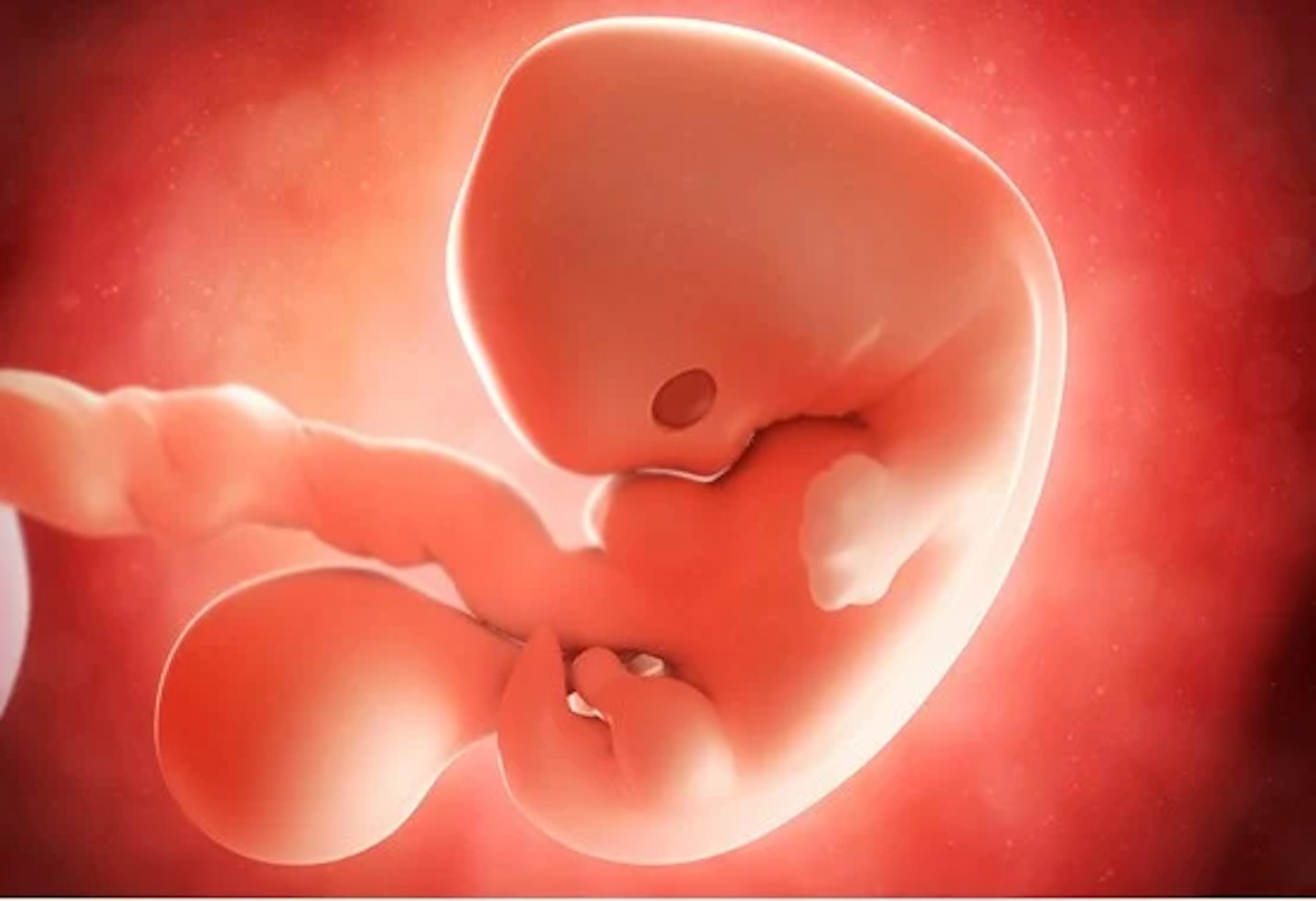Medically reviewed by Dr. Tiffany Pham
At seven weeks pregnant your belly might not be showing but you’ll start to get some different pregnancy symptoms and the beginning of that pregnancy glow (get ready for the compliments). Not only is your skin looking better than ever, but your hair is also more lustrous than that time you spent a fortune on Moroccan hair oil. These are both down to the extra estrogen you’re producing right now.
Your baby at 7 weeks pregnant
"Baby is approximately 0.37in or 9.5-10mm on average, says obstetrician and gynaecologist Tiffany Pham. "This is about the size of a blueberry or grape."
Your (very!) little one will start making his or her first movements this week.
At the moment, your baby growing inside you is probably your little secret and while you know exactly what's going on inside you, those around you will have no idea.
In terms of months (although the doctors prefer to refer to weeks) you are one month and about two weeks pregnant.

What’s my baby doing at seven weeks pregnant?
"The brain and spinal cord are both rapidly developing at this time," explains Dr Pham. "Due to the rapid development of the brain at this point, the head is much larger in proportion to the rest of the body. The baby almost resembles a tadpole at this point. The previously developed limb buds will continue to grow and cartilage will start to form. This will later develop into the bones of the arms and legs."
Yet right now, they’ll still look like paddles more than hands and feet, as fingers and toes will be webbed.
Your baby at this stage will have a more defined face, with a mouth, nostrils, ears, and eyes. The mouth, tongue, and tooth buds will also develop this week.
Your baby now has kidneys that are ready to start work, as in a few weeks, your baby will start producing urine.
They're also starting to make little jerky movements this week. You won’t be able to feel a thing, but an ultrasound would pick it up.
Most amazing of all, your baby now has its own rhythmic heartbeat!
7 weeks pregnant bump
Your pregnancy bump won’t be showing yet, because your womb still hasn’t risen (it won’t do so until the end of the first trimester), but that doesn’t mean you’re not feeling the full effects of being pregnant. From nausea to sore breasts, your body is getting ready to grow your little one! Scroll down for more on pregnancy symptoms...
7 weeks pregnant symptoms
According to Milli Hill, founder of The Positive Birth Movement and mum of three, the not-so-nice symptoms will now be setting in.
"As you get further into your first trimester, you may find you begin to experience a range of new feelings and symptoms, from the less glamorous - such as bloating, constipation, and indigestion - to the more mysterious - such as cravings, a heightened sense of smell and a new tendency to sob during cheesy TV dramas," says Milli.
Frequent urination
You’re most likely still needing to pee a lot thanks to that pregnancy hormone hCG increasing the blood flow to your pelvic area. Remember to keep drinking despite those constant toilet trips – your body and your baby needs it!
Fatigue
Growing a baby is an exhausting task, especially as your body is still making the placenta, so listen to your body and rest up. One way to keep your energy up is to keep snacking throughout the day – mini meals will keep your blood sugar up.
Breast tenderness and changes
Despite looking bigger than they’ve ever been (some women have gone up a full cup size by seven weeks pregnant), your boobs might not look their best! Noticing loads of blue veins? Of course, you can thank your hormones for that. These veins will transport all the nutrients and fluids to your baby when you begin breastfeeding.
You might also notice the areola (the dark area around the nipple) has got darker and larger and has little goose-bump-like spots. These are sweat glands that supply lubrication – all-important changes for when you start breastfeeding. For now, invest in a good maternity bra to minimise sagging. Now is also a good time to start using stretch mark cream.

Excessive saliva
Feel like you’re dribbling? Just when you thought the morning sickness was bad enough, pair it with excessive saliva and you’re in for a treat. This is another one that will disappear at the end of your first trimester, but for now, try chewing sugarless gum.
Food cravings
If you find you’ve narrowed down your menu of meals thanks to those pregnancy food aversions, try not to worry. Eating the same healthy meal every day will still give your growing babe all the nutrients they need.
What’s more, if you find your pregnancy cravings are driving you mad, give in to them once in a while.
Heartburn
Another totally normal, but totally unpleasant side effect. Avoid spicy or fatty foods and caffeinated drinks as these will make it worse, also try drinking either before or after you eat.
Gaining a few pounds
You might not look like you’re carrying a baby, but you might have gained a few pounds already. This is totally normal – most women will gain 25-35 pounds during pregnancy.
Cramping
This is normal during the first trimester, but if it occurs with bleeding or shoulder or neck pain, or you have any unusual discharge, contact your GP.
What to do at 7 weeks pregnant
• Are you bleeding?: One thing you must look out for is bleeding, whether this is in the form of light dotting or spotting, pink discharge or lots of blood. Bleeding in the first trimester affects up to 25% of women in the first trimester and doesn’t always indicate a miscarriage.
If you do notice bleeding, you must see your doctor right away. Your GP or midwife will be able to examine you both vaginally and probably via an ultrasound. In most cases, the bleeding goes away and the doctor is unable to explain it unless it’s caused by infection.
• Look after yourself: "Now is the time to rest," says Milli. "Listen to your body. It's doing something completely amazing. And listen to your mind. It's probably working overtime, too - there's a lot to take in. Try to really mother yourself with lots of nutritious meals, early nights, and plenty of whatever makes you feel calm and nurtured. Pay attention to your emotions and your mental health, too, and seek extra support if you need to."
You’re going to be feeling fatigued, bloated and sick so this is the time to be selfish. Let your friends, family, and your partner be aware that you need some support.

• Treat any skin problems: Now that you're pregnant, you might begin to see your skin is more oily or dry than usual. Acne and blotchiness are completely normal. To help with your new-found sensitive skin, it's worth researching the best skincare products to use during pregnancy.
• Think about exercise: There is a lot of scaremongering around exercising while pregnant, but keeping fit and active has been shown to help make your whole pregnancy and labour itself much easier. Chat with your midwife or GP before you get started. It's also worth investigating specific pre-natal fitness classes such as pregnancy yoga.
• Limit caffeine: "If you have not already done so, try to limit your caffeine intake to 200mg or less per day, which is equivalent to a 12 oz cup of coffee," recommends Dr Pham. This is because high levels of caffeine have been linked to pregnancy complications like low birth weight.
• Keep hydrated: On the topic of beverages, you should ensure that you are getting adequate hydration. "The recommended daily intake of water or fluids is about 8-12 cups per day (64-96 oz)," says Dr Pham. "This may increase your urge to urinate, if you find it bothersome to have to frequently pee in the middle of the night, try to avoid consuming excess fluids 1-2 hours before bedtime."
• Get your mouth checked!: Many people don't realise that the health of your mouth is important to keep checking while you’re pregnant. You may experience bleeding gums, mainly down to those pesky hormones. Go to the dentist so your oral hygiene and routine can be looked at.
• Boost your folic acid levels: If you haven't been taking it already, you should start taking folic acid now as it can help prevent defects in your baby's development. You can take it through supplements or naturally through foods high in folic acid such as nuts and breakfast cereal high in folic acid.
• Stock up on vitamins: "Ensure that you are getting enough of these vitamins and minerals in your diet or through supplements - vitamin C, calcium, vitamin D, iron, and choline," says Dr Pham. "The recommended daily doses of these vitamins and minerals are as follows:"
Vitamin C: 85 mg
Calcium: 1000 mg
Vitamin D: 600-800 IU
Iron: 27 mg
Choline: 450 mg
• Up your fibre: "If you are struggling with more constipation or bloating, try increasing the amount of fibre-rich foods in your diet such as whole grains, fruits, vegetables, chia seeds, lentils or chickpeas," suggests Dr Pham.
Stephanie Spencer is the Deputy Digital Editor at Mother&Baby and auntie to four aged 8 to 6 months old. With a particular interest in health, she loves discovering products that make parent’s lives easier.
About the expert
Dr. Tiffany Pham is a board-certified obstetrician and gynaecologist and medical advisor for Flo Health, based in Houston, Texas. Pham is passionate about helping women get access to necessary health services and medically-accurate health information and better understand their bodies.
Milli Hill is a freelance writer and the founder of the Positive Birth Movement. The mum of three writes tips and advice on how to have happier labour experiences.
